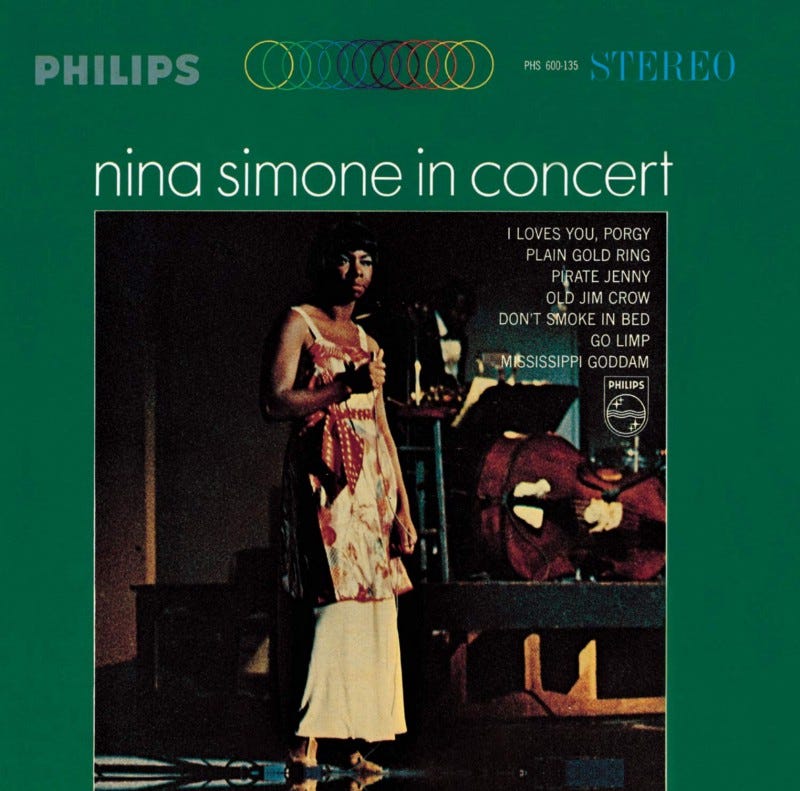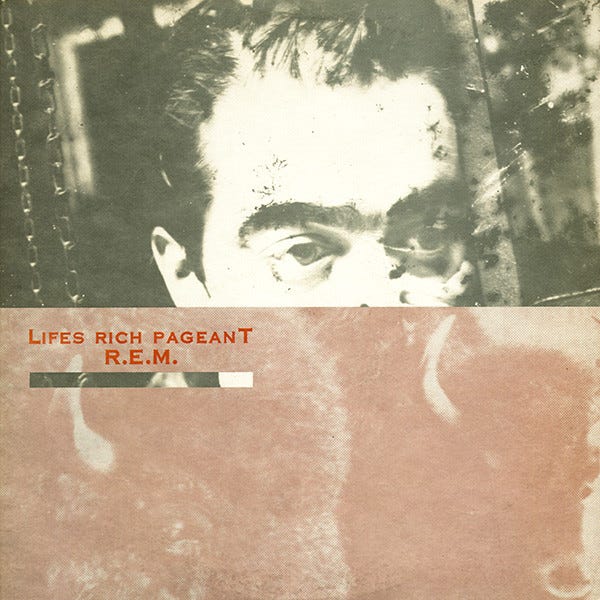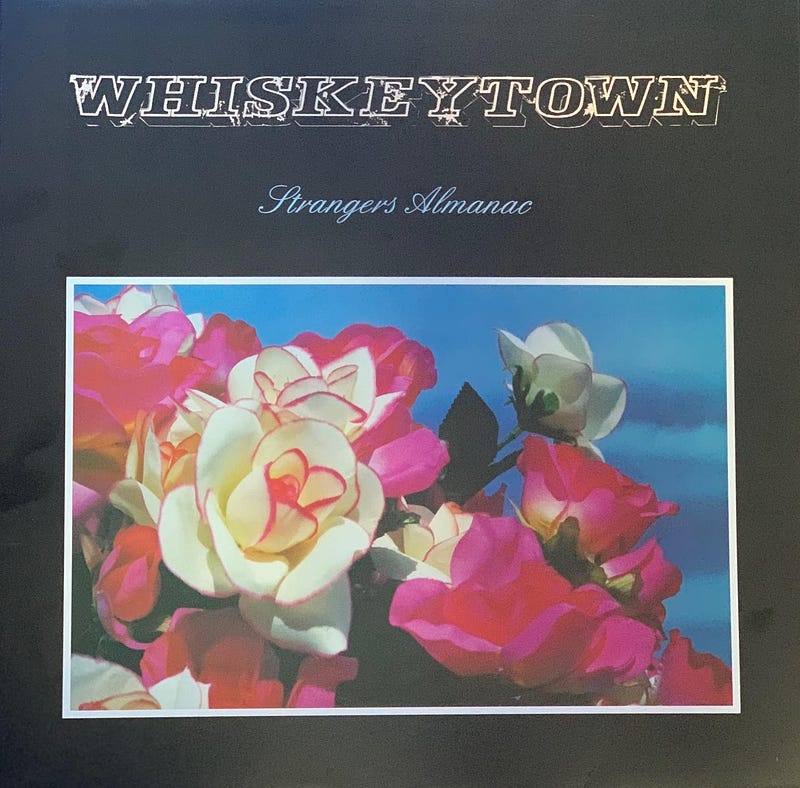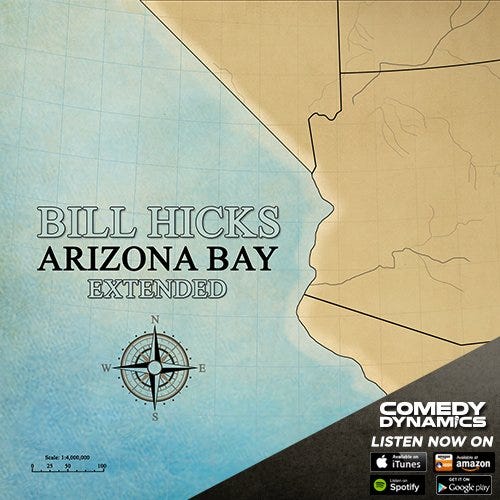Because you’ve just finished watching Ozark.
30 March 2020
Robert Plant and Alison Krauss
Raising Sand
2007
When you put three A-list enormously talented, exceptionally talented, and highly influential and very creative musicians in a recording studio, all bets are off.
It could be shit. It could not be.
In the case of Robert Plant (Led Zeppelin), Alison Krauss and producer T-Bone Burnett, it was very far from shit.
What came out was 2007’s Raising Sound — a brilliant and eclectic album from one of the best voices in rock, one of the most talented artists in bluegrass/country and a producer operating at the peak of his powers.
If you have never heard the album, whatever you may know, or think you know, of the artists set that aside. None of what you know applies here.
Raising Sand is an album of covers by the likes of The Everley Brothers, Townes Van Zandt, Allen Toussaint, and Tom Waits, et al.
This is one of the best albums of 2007.
After winning a bunch of Grammy Awards, Raising Sand would go on to top the Billboard Rock Charts, Internet Albums and got stuck behind Taylor Swift at #2 on the Billboard Country Chart.
Everyone involved has hinted at another album but as the years go by that seems unlikely. After one failed attempt in the studio, I think they may have realized that —
Sometimes you only catch lightening in a bottle once.
31 March 2020
Nina Simone
Nina Simone in Concert
1964
Recorded at Carnegie Hall, this is the album that marks Nina Simone’s entry into the Civil Rights era.
Songs like “Old Jim Crow”, “Go Limp” and the powerful “Mississippi Goddam” speak volumes and are unmistakable in the message.
Her distinctive voice made it an impossibility to label her or pigeon hole her as any type of specific singer. Nina Simone in Concert gives a look at the artist just ascending to the peak of her powers.
“Strange Fruit” by Billie Holiday and “Mississippi Goddam” by Simone are two of the most well-known songs about racial discrimination.
“Strange Fruit”, written by a white-guy, takes a more poetic and metaphorical look at racism, specifically lynching. This is not to say it’s not worthy of the notice it continues to receive…it’s just that “Mississippi Goddam” blasts open the door on discrimination.
When “Mississippi Goddam”, written by Simone, is introduced, the audience chuckles. They won’t be laughing by the end because the song is anything but metaphorical:
Hound dogs on my trail
School children sitting in jail
Black cat cross my path
I think every day’s gonna be my last
Lord have mercy on this land of mine
We all gonna get it in due time
…
Yes you lied to me all these years
You told me to wash and clean my ears
And talk real fine just like a lady
And you’d stop calling me Sister Sadie
Oh but this whole country is full of lies
You’re all gonna die and die like flies
I don’t trust you anymore
…
You don’t have to live next to me
Just give me my equality
“Mississippi Goddam” ushered in an undisguised and unabashed social commentary into contemporary music that would make its way across genres during one of the most volatile times in recent American history.
Almost 60 years old now, Nina Simone in Concert still packs a punch. It captures one of the best female vocalists, songwriters and strongest personalities in modern music right at that moment.
1 April 2020
R.E.M.
Lifes Rich Pageant
1986
If you’re under a certain age, it would be impossible to explain the historical significance of R.E.M. to the music industry.
If you’re above a certain age, you don’t care.
R.E.M. may not have created the genre of “college rock” in the 80s but they did become the face of it.
R.E.M. was one of the biggest bands (along with U2) that sprung from that movement. Suffice it to say, without R.E.M. (or U2) there is a laundry list of bands and artists that may not exist or if they did, they’d sound wildly different.
But I suppose for many, R.E.M. is just that band that sang “Losing My Religion” and “Man on the Moon”. While both are great songs from great albums, the band is much more than the hits the scored.
Where the first two R.E.M. albums (Murmur and Reckoning)were muted in their sound with singer Michael Stipe’s vocals often deliberately buried in the mix.
The commercially and critically disappointing third album, Fables of the Reconstruction, found a marginal departure to a cleaner, yet more dense, sound.
Standing at a career crossroads, the band selected producer Don Gehman to produce their fourth album. Gehman was riding a wave of success after working with John Mellencamp and helping him hone and perfect his sound.
So R.E.M. decamped to Belmont, Indiana to record with Gehamn in Mellencamp’s studio. And what resulted, Lifes Rich Pageant sounds like a natural progression for the band. While not necessarily a hard turn away from their sound, it was a brilliant evolution for the band.
Perhaps most noticeable was that Gehman made the decision to bring Stipe’s vocals to the front. For longtime fans, it meant you could finally understand what he was singing.
Not that it helped much with comprehension. Stipe’s lyrics at that time were often metaphorical to the point of bewilderment.
Whether his vocals were upfront in the mix or buried, you were still left wondering WTF the song was about.
Lifes Rich Pageant was released in July 1986 and immediately embraced by both critics and fans.
The first single, “Fall On Me” and the last single, a cover of “Superman” both charted well and certainly brought new fans into the fold. However, for me, it’s the middle section of Lifes Rich Pageant, that foreshadows the direction they were headed:
Track 4 — “Cuyahoga”
Track 5 — “Hyena”
Track 6 — “Underneath the Bunker”
Track 7 — “The Flowers of Guatemala”
Track 8 — “I Believe”
Track 9 — “What If We Give It Away”
A six-song cycle that was both brilliant and fascinating in sound…but also frustrating if only because you had to interrupt it to switch sides of the album or cassette. It almost made you almost thankful for the advent of the CD so you could listen to the songs straight through.
Lifes Rich Pageant was the band’s most successful album to that point — becoming the band’s first album to go gold within months (January 1987) and not years after its release.
The album even prompted Rolling Stone to put them on the cover in December of 1987 with the top line “America’s Best Rock and Roll Band.”
The band would release one more album on the independent IRS Records before jumping ship to major label Warner Brothers. And from there they would achieve the kind of world-wide success all bands crave yet few achieve…and even fewer worthy of achieving.
Of course, it can be argued that there are better R.E.M. (and more successful) albums, but it’s on Lifes Rich Pageant that the band turned a creative corner and leaned into a particular sound and direction. It would mark the beginning of their steady ascension to becoming one of the biggest bands in the world.
It’s Lifes Rich Pageant that made the Gods take note and begin making room for the band in the pantheon of rock and roll for the four guys from Athens, GA.
It’s also my favorite R.E.M. album.
2 April 2020
Whiskeytown
Strangers Almanac
1997
First, we should address the elephant in the room.
Ryan Adams was in Whiskeytown. And while he was the voice and principal songwriter, it should be noted that he was not the only member.
Despite having a revolving door through most of the band’s life, the musicians who recorded Strangers Almanac were Caitlin Cary on violin and background vocals, Phil Wandscher on guitar, Jeff Rice on bass and Steven Terry on drums. Six of the 13 songs were co-written by others and Adams, this wasn’t Ryan Adams & Whiskeytown…they were a band.
That said, it’s never been any secret that Ryan Adams was kind of…moody and cantankerous. Definitely a very talented songwriter. But his career is littered with stories of awful behavior and mistreatment of people.
So was it a great shock when The NYTimes reported that he had used his status in the industry to manipulate women sexually (including his ex-wife Mandy Moore)…and retaliated when he was rebuffed? Was it a shock when the FBI opened an investigation to find out if he had engaged in sexually explicit text messages with a minor? Well, yes, I must admit that I, along with many, didn’t see that in the cards.
Ryan Adams has steadfastly denied all allegations.
I find that kind of behavior despicable. I don’t pretend to understand that kind of behavior from anyone and have a very hard time reconciling it in my head.
However, I feel at some point we have to be able to separate the art from the artist. We’ve certainly done it in the past. The art world, be it fine art, music, film, theater, etc. is chock-full of this type of stuff.
It does NOT condone it. There’s no excuse for it.
Historically:
Pablo Picasso had a predilection for younger women/girls and his paintings sell for tens/hundreds of millions and sit in the finest museums in the world.
Charlie Chaplin was notorious for his love of young women/girls & is one of the most revered comedians/filmmakers in cinema.
Jerry Lee Lewis (aka The Killer) married his 13-year-old second cousin & is considered one of the founders of rock and was inducted into the Rock and Roll Hall of Fame in 1986.
Jimmy Page carried on an affair with 14-year-old “baby groupie” Lori Maddox at the height of his popularity & has an OBE (Order of the British Empire for his contributions to music), a Kennedy Center Honor (for his contribution to American art) given to him by then-President Barack Obama, and is a two-time inductee in the Rock and Roll Hall of Fame (The Yardbirds and Led Zeppelin).
Michael Jackson has had numerous accusations and lawsuits about his predilection of minors & is a two-time inductee into the Rock and Roll Hall of Fame (The Jackson 5 and solo) and is one of the best selling musical artists in recorded history.
MORE RECENTLY:
Former Vice President Joe Biden, the apparent democratic front runner has just recently been accused of sexually assaulting staff member Tara Reade (not the actress) and then tanking her career.
Christ, the President of the United States had a long time relationship with CONVICTED pedophile Jeffery Epstein and has admitted to being a bona fide serial sexual assaulter…AT BEST.
It’s terrible that it’s quite feasible that the upcoming race for President of the United States cold pit one sexual assaulter against another. How fucked up is that?
In any event, those are just the ones I thought of without doing any research.
So evidently, as a culture, we’re capable of overlooking people’s horrible behavior.
Which doesn’t excuse the behavior, they should all be held accountable in ever manner possible.
With that said…
Now, the music of Whiskeytown’s debut album, Strangers Almanac.
Recorded when Adams was around 19 or 20, this album is one of those that can qualify as a masterpiece. His lyrical prowess and precision were well beyond his years and the sound that seven-time Grammy-winning producer Jim Scott was able to capture from the band as a whole is nothing short of perfection (a trait for which Scott would repeat often…across genres).
The songs here sound like they were professionally recorded in an acoustically perfect basement with your best friends. It generates that kind of intimacy.
Songs like “Excuse Me While I Break My Own Heart Tonight” highlight a clever wordplay that is akin to Paul Westerberg of The Replacements. “Houses on the Hill”, “Dancing with the Women at the Bar” and “Somebody Remember a Rose” paint a visual, almost cinematic landscape, that is a direct descendant of Bob Dylan’s Blood on the Tracks.
Don’t be fooled by the seeming simplicity of “Turn Around” or “Losering”, it’s what gives the songs their power.
Strangers Almanac introduced Ryan Adams to the world…and placed him in the crosshairs of an industry infamous for its complicated, and corrupt, approach towards artists.
And notorious for its leniency.
Until recently, Adams seemed to handle it better than most.
There are two things that American’s seem to love the most:
Completely taking down someone.
A comeback.
Given the indiscriminate nature in which we take down people for ill behavior (see any CEO on Wall Street or current POTUS), I don’t suspect this sort of cycle is going to stop.
And from now on, I don’t know if we’ll be capable of separating the art from the artist. Culturally, I think we have some demons to wrestle in order to address that…and I sadly don’t think we will.
Nonetheless, Whiskeytown’s Strangers Almanac was recorded before all of this and wherever history lands on Ryan Adams, don’t discount the contributions of Caitlin Cary, Phil Wandscher, Jeff Rice, Steven Terry and the other musicians who all contributed to making Strangers Almanac one of the best albums in the past 30 years.
3 April 2020
Bill Hicks
Arizona Bay
1997
When people gather and attempt to rank stand-up comedians, you can usually find Bill Hicks ranked in the top ten.
Lately, millennial stand-ups are re-evaluating Hicks and his comedy and, to no shock at all, they find him “mean”, “angry”, and “misogynistic” (here’s hoping they never listen to Sam Kinison).
From what I’ve read, and heard, Hicks was neither of those, but I can concede how his comedy could be seen that way. Do you know what else it was? Fucking intelligent and hysterical.
I first read about Bill Hicks from John Lehr’s 1993 New Yorker article “The Goat Boy Rises” which details how he was banned on CBS’ The Late Show with David Letterman…after appearing on 10 times on his NBC show Late Night with David Letterman. I became obsessed.
Because he died of pancreatic cancer in 1994, his comedy rests in a time capsule.
Arizona Bay was his first posthumous release and covers topics like the L.A. riots, the JFK assassination, George H.W. Bush's defeat in 1992, Abortion, Saddam Husain, Marketing, et al…so unless you’re familiar with those things the comedy may sound dated. However, the Bush jokes were almost prophetic because they played scarily well again in the early aughts when his son George W. Bush was president.
His joke about going to war with Iraq During the first Gulf War, Operation Desert Storm:
“The intelligence reports would come in and say Iraq…intelligent reports would come in ‘they have incredible weapons, incredible’”
“How do ya’ll know that?”
“We looked at the receipts.”
That joke plays just as well the second time around.
Listen to “Marketing and Advertising” here and tell me that’s still not applicable.
Bill Hicks never found much of an audience here in the states. In the UK, he was very popular selling out 2k seat venues and yet here in the states he struggled to fill a comedy club…at the height of stand-up comedy and the comedy club explosion.
That said, other stand-ups revered him. Some so much so, they “borrowed” his style (Denis Leary) and some even stole his jokes (Bill Mahr). Leary was perhaps the one who most parroted Hicks…but all these years later, it doesn’t matter much and Leary was enough of an artist that he carved out his own place.
Look, was Bill Hicks a perfect person. No. Probably not. BUT, he was a stand-up comedian…pick up ANY book about a stand-up comedian and you’ll soon discover that being fucked-up is part of their DNA.
Was he a bit misogynistic? Comedically, perhaps. Personally, I don’t know…but from what I’ve read, no…and a close friend used to book him on the David Letterman show and had nothing but wonderful things to say about him.
One thing is certain, there is no record of sexual assault (Louis C.K.) or of being a rapist (Bill Cosby).
Is it unfair for comedians who have no context in which to place Bill Hicks re-visit and re-evaluate his comedy? No, it’s not unfair…it’s just dumb.
Along with Sam Kinison, Hicks was part of a comedy wave that was pissed off…and in the 80s and 90s there was much to be pissed off about…a lot like now.
A Guardian article from 2019 quoted comedian Dwight Slade from the 2009 documentary American: The Bill Hicks Story talking about modern comedians reluctance to offend (which has only increased in the 11 years since the release of that documentary):
“It’s not enough just to make jokes about it. You have to kick over some tables.”
Bill Hicks kicked over tables…always. His comedy, and the genre of comedy as a whole, is the better for it.
I’m not going to make an argument against people taking a revisionist view of his work. I may think it’s silly but do the same to Richard Pryor, Sam Kinison, Louis C.K., Bill Cosby…anyone, take your pick.
I recently re-watched Eddie Murphy’s “Delirious” from 1983 and you know what? It’s still fucking brilliant! That said, there is no way on earth he could do that material today. Through the lens of modern morality, it’s horrible…but still brilliant and funny.
Certainly, if you’re over a certain age, Bill Hicks is going to play a little better for you…but even if you’re not, there is still many jokes here and on his other albums that are well worth listening to.
I don’t know if Bill Hicks was ahead of his time but I can say comedy would not be the same today without him. Now, whether you consider that good or bad is up for debate.
4 April 2020
Lone Justice
Lone Justice
1985
Lone Justice was one of the better bands to emerge from the L.A. Cowpunk scene of the early 80’s — unfortunately, you’ve probably never heard of them.
Fronted by whirling dervish Maria McKee- imagine Stevie Nicks with a snarl — Lone Justice quickly made a name for themselves in the uber-competitive L.A. music scene.
Eventually earning the support of Heartbreaker (of Tom Petty and the Heartbreakers) Benmont Tench, Linda Ronstadt, and Dolly Parton who said:
Maria McKee was “The greatest girl singer any band could ever have.”
After a flurry industry interest, the band signed to the then ascendant Geffen Records. Hiring A-list producer Jimmy Iovine the band bunkered down in Los Angeles to record their debut.
Geffen took no chances and hired songsmiths Tom Petty, Mike Campbell, Benmont Tench and former E-Street’er and Disciple of Soul, Steven Van Zandt. Where needed they also pitched in as musicians.
Their self-titled debut starts strong, if almost too stringent, but by the last few songs, it sounds like the band got to cut loose a little. And you can hear it. This is not to say the first half is bad in any way it’s just very…precise.
This Lone Justice album clocks in at under 40 minutes and doesn’t need a minute more. What the music business seems to have been forgotten over the years is that “simplicity is the ultimate sophistication”.
Put another way, just because you CAN make a one-hour album, doesn’t mean you SHOULD make a one-hour album. How many albums can you think of that would be infinitely better if they trimmed it down a song or two? Exactly.
The reviews on Lone Justice were good to great. Deservedly so. The album was on many “Best of” lists for 1985, including the coveted Village Voice list.
Rolling Stone even went so far as to say the Lone Justice debut was “one of the greatest albums ever made”.
Despite having all the ingredients, Lone Justice, the band or the album, didn’t find an audience…but the industry is littered with great artists who never quite “made it”…thankfully, there is recorded evidence of just how good some fo these artists, like Lone Justice, were.
5 April 2020
Vladimir Horowitz
Vladimir Horowitz Plays Chopin
2006
Two hours of one of the greatest piano players in history playing music from one of the greatest composers in history…what more needs to be said here?
Exactly.











